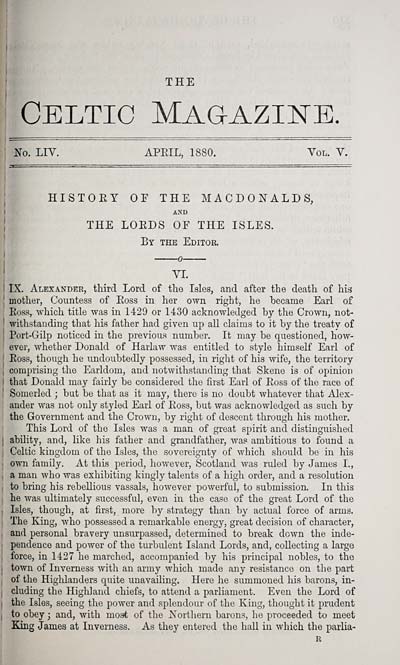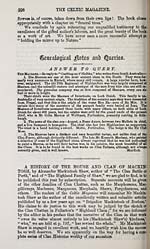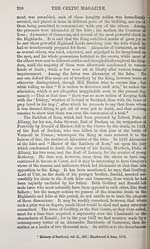Blair Collection > Celtic magazine > Volume 5
(219)
Download files
Complete book:
Individual page:
Thumbnail gallery: Grid view | List view

THE
Celtic Magazine.
No. LIV. APEIL, 1880. Vol. V.
HISTOEY OF THE MACDONALDS,
AND
THE LOEDS OF THE ISLES.
By the Editor.
VI.
IX. Alexander, third Lord of the Isles, and after the death of his
mother, Countess of Eoss in her own right, he became Earl of
Eoss, which title was in 1429 or 1430 acknowledged by the Crown, not-
withstanding that his father had given up aU claims to it by the treaty of
Port-Gilp noticed in the previous number. It may be questioned, how-
ever, whether Donald of Harlaw was entitled to style himself Earl of
Eoss, though he undoubtedly possessed, in right of his wife, the territory
com^^rising the Earldom, and notwithstanding that Skene is of opinion
that Donald may fairly be considered the first Earl of Eoss of the race of
Somerled ; but be that as it may, there is no doubt whatever that Alex-
ander was not only styled Earl of Eoss, but was acknowledged as such by
the Government and the Crown, by right of descent through his mother.
This Lord of the Isles was a man of great spirit and distinguished
ability, and, like his father and grandfather, was ambitious to found a
Celtic kingdom of the Isles, the sovereignty of which should bo in his
own family. At this period, however, Scotland was ruled by James I.,
a man who was exhibiting kingly talents of a high order, and a resolution
to bring his rebellious vassals, however powerful, to submission. In this
he was ultimately successful, even in the case of the great Lord of the
Isles, though, at first, more by strategy than by actual force of arms.
The King, who possessed a remarkable energy, great decision of character,
and personal bravery unsurpassed, determined to break down the inde-
pendence and power of the turbulent Island Lords, and, collecting a large
force, in 1427 he marched, accompanied by his principal nobles, to the
town of Inverness with an army which made any resistance on the part
of the HigUanders quite unavailing. Here he summoned his barons, in-
cluding the Higliland chiefs, to attend a parliament. Even the Lord of
the Isles, seeing the power and splendour of the King, thought it prudent
to obey ; and, with most of the Northern barons, he proceeded to meet
King James at Inverness. As they entered the hall in which the parlia-
Celtic Magazine.
No. LIV. APEIL, 1880. Vol. V.
HISTOEY OF THE MACDONALDS,
AND
THE LOEDS OF THE ISLES.
By the Editor.
VI.
IX. Alexander, third Lord of the Isles, and after the death of his
mother, Countess of Eoss in her own right, he became Earl of
Eoss, which title was in 1429 or 1430 acknowledged by the Crown, not-
withstanding that his father had given up aU claims to it by the treaty of
Port-Gilp noticed in the previous number. It may be questioned, how-
ever, whether Donald of Harlaw was entitled to style himself Earl of
Eoss, though he undoubtedly possessed, in right of his wife, the territory
com^^rising the Earldom, and notwithstanding that Skene is of opinion
that Donald may fairly be considered the first Earl of Eoss of the race of
Somerled ; but be that as it may, there is no doubt whatever that Alex-
ander was not only styled Earl of Eoss, but was acknowledged as such by
the Government and the Crown, by right of descent through his mother.
This Lord of the Isles was a man of great spirit and distinguished
ability, and, like his father and grandfather, was ambitious to found a
Celtic kingdom of the Isles, the sovereignty of which should bo in his
own family. At this period, however, Scotland was ruled by James I.,
a man who was exhibiting kingly talents of a high order, and a resolution
to bring his rebellious vassals, however powerful, to submission. In this
he was ultimately successful, even in the case of the great Lord of the
Isles, though, at first, more by strategy than by actual force of arms.
The King, who possessed a remarkable energy, great decision of character,
and personal bravery unsurpassed, determined to break down the inde-
pendence and power of the turbulent Island Lords, and, collecting a large
force, in 1427 he marched, accompanied by his principal nobles, to the
town of Inverness with an army which made any resistance on the part
of the HigUanders quite unavailing. Here he summoned his barons, in-
cluding the Higliland chiefs, to attend a parliament. Even the Lord of
the Isles, seeing the power and splendour of the King, thought it prudent
to obey ; and, with most of the Northern barons, he proceeded to meet
King James at Inverness. As they entered the hall in which the parlia-
Set display mode to: Large image | Transcription
Images and transcriptions on this page, including medium image downloads, may be used under the Creative Commons Attribution 4.0 International Licence unless otherwise stated. ![]()
| Early Gaelic Book Collections > Blair Collection > Celtic magazine > Volume 5 > (219) |
|---|
| Permanent URL | https://digital.nls.uk/76451461 |
|---|
| Description | Volume V, 1880. |
|---|---|
| Shelfmark | Blair.6 |
| Attribution and copyright: |
|
| Description | A selection of books from a collection of more than 500 titles, mostly on religious and literary topics. Also includes some material dealing with other Celtic languages and societies. Collection created towards the end of the 19th century by Lady Evelyn Stewart Murray. |
|---|
| Description | Selected items from five 'Special and Named Printed Collections'. Includes books in Gaelic and other Celtic languages, works about the Gaels, their languages, literature, culture and history. |
|---|

